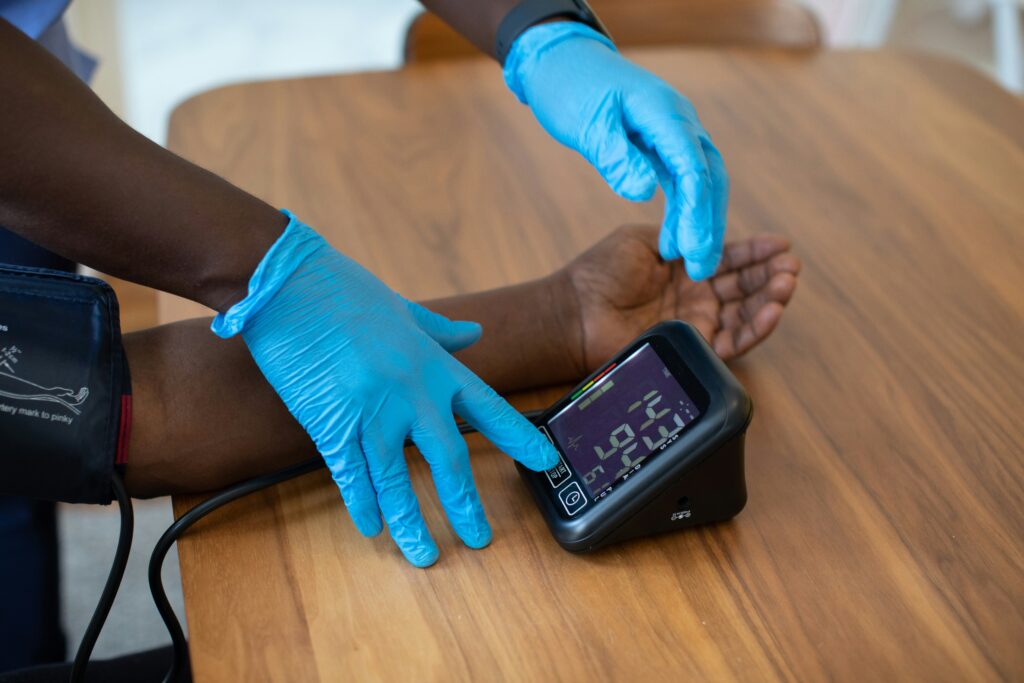I remember sitting in the waiting room, heart racing, hands sweaty, rehearsing what I was going to say. Only to forget all of it the moment the doctor walked in. It’s a feeling so many of us know all too well, especially when we’re already overwhelmed. Learning how to talk to your doctor isn’t always easy, but it can make a huge difference in getting the care and clarity you need. Sometimes it starts with just taking a deep breath and knowing you deserve to be heard.
The truth is, medical appointments can be overwhelming. You go in with questions and concerns, but the pressure of a short visit, the unfamiliar terms, and the fear of being dismissed can make it hard to speak up. Sometimes, you leave feeling even more confused than when you arrived.
If you’ve ever walked out of a doctor’s office thinking, “I wish I had said more,” you’re not alone.
This post is here to help you prepare, feel more in control, and find your voice, even when you’re feeling anxious or unsure. You deserve to be heard, and you deserve answers that make sense to you.
Why It’s So Hard to Speak Up at the Doctor’s Office
For many of us, doctor’s appointments don’t just bring up physical symptoms. They stir up a whole lot of emotion too. Maybe you’ve felt rushed before. Maybe a provider dismissed your concerns, or maybe you didn’t even get a chance to explain them.
There’s a real power dynamic in that room. You’re sitting there feeling vulnerable, while the person across from you holds the knowledge, the charts, and sometimes the final say. Even if they’re kind, it can still feel intimidating.
And when you’re overwhelmed, your brain isn’t at its best. You might forget what you meant to ask. You might downplay your pain or skip over something important because it feels awkward or scary to say out loud. It happens more than you think.
Sometimes, just the act of booking the appointment is exhausting. So when it finally comes around, you’re already mentally drained. That makes it even harder to explain complex symptoms, especially if you’ve been dealing with them for a long time.
It’s important to know that this doesn’t mean you’re weak or dramatic. It means you’re human. And it’s okay to feel this way.
The good news? There are ways to prepare ahead of time so you don’t have to carry everything in your head. Let’s talk about how to do that.

How to Prepare Before Your Appointment
One of the most powerful things you can do is walk in prepared. I learned this the hard way, after too many appointments where I left thinking, “Wait… I forgot to mention that.” Now, I never go in without a list. It sounds simple, but it makes all the difference.
Start by writing everything down. Don’t rely on memory, especially when you’re anxious. List your symptoms, when they started, how often they happen, and anything that makes them better or worse. If there’s a new concern, jot that down too, even if it feels small. What matters is how you feel.
Once you have your list, try to choose your top 1–3 priorities. Doctors often have limited time, and starting with what matters most helps you make sure those things get addressed first. If there’s time left, you can bring up the rest. Part of learning how to talk to your doctor is knowing how to organize your concerns so nothing important slips through the cracks.
If you feel nervous about speaking up, practice what you want to say. You can even write a short script or rehearse it with a friend. It’s not silly. It’s smart. Practicing ahead of time can help you feel more in control when the moment comes.
Bringing a support person can also be a huge help. Someone who can take notes, ask questions, or just be there with you. You don’t have to do this alone, especially if you know you tend to freeze or shut down when you’re overwhelmed.
Finally, bring a notepad or use your phone to take notes during the appointment. That way, if your brain checks out halfway through, you’ll still leave with everything you need to know. It’s okay to ask the doctor to slow down or repeat something, too. We’ll talk more about that next.
How to Talk to Your Doctor When You’re in the Room
The door closes, and the doctor says, “What brings you in today?” Suddenly, your mind goes blank. It happens to so many of us. That’s why it helps to have a plan for what you want to say and how you want to say it.
Start with your most urgent concern. Even if you have a whole list, lead with the thing that’s bothering you most. You might say, “I wrote down a few things, but the main reason I came in is…” That simple sentence sets the tone and helps the doctor focus.
Use clear, simple language. You don’t need medical terms. Just describe what you’re feeling in your own words. Say where it hurts, how long it’s been happening, and how it’s affecting your daily life. The more specific you can be, the better they’ll understand.
It’s also okay, more than okay, to name your emotions. If you’re scared, say so. If you’re overwhelmed, say that too. I’ve told my doctor before, “I’m feeling anxious, so I might forget things. I brought notes just in case.” No one judged me for it. If anything, it helped them take me more seriously. Learning how to talk to your doctor sometimes starts with being honest about where you’re at emotionally.
Don’t be afraid to slow the conversation down. If the doctor is going too fast or using terms you don’t understand, speak up. You can say, “Can you explain that in simpler terms?” or “I just need a second to process that.” Your time in that room is yours. You deserve to understand what’s happening.
If it helps, repeat things back in your own words. Say, “So just to make sure I got this right…” and summarize what you heard. That way, you’ll walk away with clarity and confidence.

Advocate for Yourself (Without Feeling Rude)
It can feel uncomfortable to push back or ask questions during a medical appointment, especially if you were raised to “just trust the doctor.” But asking for clarity or voicing your concerns isn’t rude. It’s part of taking care of yourself.
You are the expert on your body. Your doctor may know medicine, but only you know how you feel day to day. That means your voice matters in the room, even if it feels shaky at first.
If something doesn’t sit right with you, speak up. You can say, “That doesn’t quite match what I’ve been experiencing,” or “I’m not sure I understand how that works. Can we go over it again?” Those questions are completely valid. You’re not being difficult. You’re being thorough.
It’s okay to ask for a different approach if something isn’t working. You can ask, “Are there other options?” or “What would happen if we waited a little longer before deciding?” These kinds of questions can lead to more collaborative, thoughtful care.
If you feel rushed, it’s also okay to say, “I know time is limited, but I really need a minute to go over this.” Or ask if a follow-up visit can be scheduled to cover the rest. Doctors don’t always realize when patients are holding back, especially if you seem calm on the outside. Part of how to talk to your doctor is learning how to advocate for the time and clarity you need, even in a short appointment.
The truth is, you’re not being pushy by advocating for yourself. You’re being brave. It’s not easy, but it’s powerful, and it gets easier with practice.
What to Do After the Appointment
The appointment might be over, but that doesn’t mean your questions or thoughts stop there. In fact, for a lot of us, the second we leave the office, we start remembering everything we meant to say, but didn’t.
First, take a few minutes to go over any notes you took or papers the doctor gave you. If there’s a summary or visit report, read it while it’s still fresh in your mind. That way, you can catch anything that feels unclear before too much time passes.
If you’re unsure about something, don’t be afraid to call the clinic. You can ask to speak with a nurse or request a follow-up email or call with your provider. Many clinics also have online portals now, where you can message your care team directly. That can be a great way to ask a question without the pressure of being in person.
If something was missed during the appointment, write it down for next time. This could be a symptom, a side effect, or even just a question you want to revisit. Having a running list helps take the pressure off your memory and keeps your next visit more focused.
Also, take a moment to check in with yourself emotionally. How did that appointment feel? Did you feel heard and respected? Were you able to ask what you needed? Use those reflections to decide what you want to do differently next time, or even whether it might be time to look for a new provider.
You don’t have to do everything perfectly. Just showing up, asking questions, and taking notes is already a win. Every time you speak up, you’re building confidence and taking control of your health in a powerful way. How to talk to your doctor isn’t about getting it right every time. It’s about making progress, one step at a time.
Talking to a doctor when you’re feeling overwhelmed isn’t easy. It takes courage to show up, especially when your mind is racing or your body doesn’t feel right. But your voice matters. Even when it shakes.
You don’t have to know all the right words. You don’t have to be calm or put-together. You just have to be honest about what you’re going through. That honesty is powerful.
Every time you speak up, you’re advocating for yourself. That’s not weakness. It’s strength. You deserve answers. You deserve care that makes sense to you. And you deserve a provider who listens.
If you’re still working on finding that confidence, it’s okay. Start small. Bring your notes. Practice what you want to say. And know that every appointment is a chance to grow into your voice a little more.
Most importantly, don’t give up. You are your own best advocate, and you’re doing better than you think.
Want more support on your wellness journey?
Sign up for the Healthy American newsletter for tips, stories, and practical tools to help you take control of your health, without the overwhelm.

Leave a Reply
You must be logged in to post a comment.